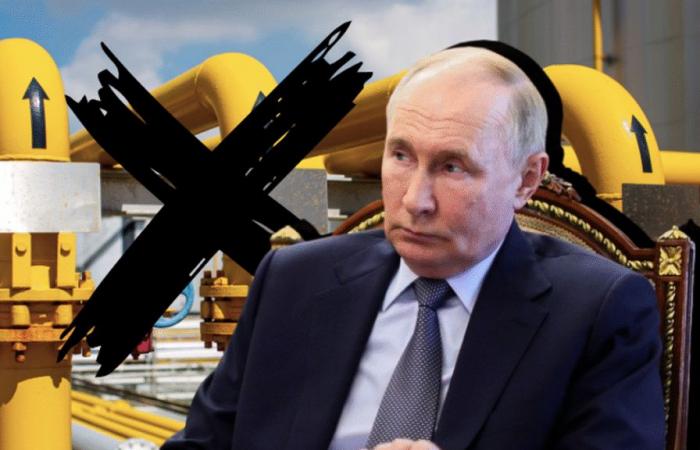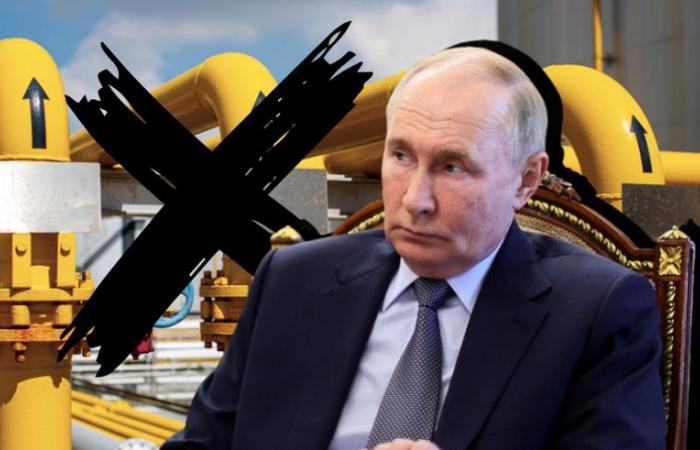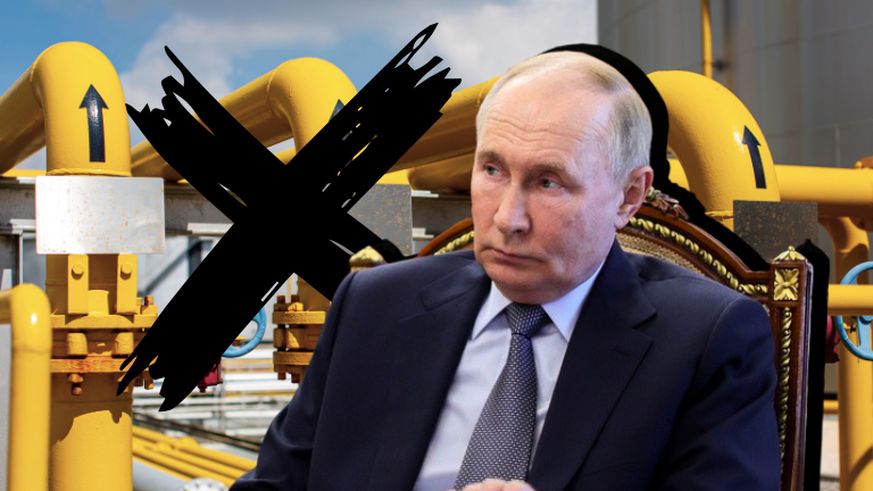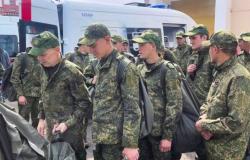The European Commission unveiled its plan on Tuesday to definitively put an end to the imports of Russian gas by the end of 2027. A challenge that remains difficult as the dependence on Europe remains important.
06.05.2025, 16:5206.05.2025, 16:52
Nathalie ALONSO / Paris, France
More “international”
Three after the start of the war in Ukraine, Europeans continue to consume a lot of Russian gas, in particular liquefied natural gas (LNG).
The European Commission presented its plan to do without Russian energies. The European executive proposes to act in two stages: the prohibition of new contracts and short contracts (spot) existing with Russian companies at the end of 2025, then the extinction of all imports of gas since Russia two years later. “It is now time for Europe to completely break its energy ties” with Russia by Vladimir Putin, launched the president of the Ursula von der Leyen commission, more than three years after the invasion of Ukraine.
How will the member states position themselves? Some like Hungary do not hide their proximity to Moscow. Others are increasingly dependent on Russian LNG. Weaning promises to be delicate, taking into account political and legal obstacles.
Why is this gas so important for Europe?
In 2021, before the war in Ukraine, 45% of imports from the European Gas Gas (gas gas transported by gas pipelines and liquefied gas delivered by ships) came from Russia, then its first supplier, according to EU statistics.
Europe has since considerably reduced its dependence on Moscow with the gradual drying up of gas pipeline flows after the Russian invasion of February 2022, in response to international sanctions.
But the EU remains today still addicted to gas from Russia, which is still its second supplier, after Norway: last year, Russia represented 18% of its imports of gas by gas pipelines and 20% of its LNG contributions. For this highly prized liquid gas from Europeans, Russia arrives just after the United States (45% of EU imports).
At the end of April, the president of the European Commission, Ursula von der Leyen admitted that there was still a long way to go.
“We all know that there is still a lot to do”
Ursula von der Leyen, president of the European Commission
Since the energy crisis after the post-Cavid resumption in 2021 and even more after the start of the war, Europe has massively turned to LNG, this gas unloaded in ports, regasified then injected into the European gas network: it represented 37% of imports of gas in the EU in 2024, for 63% by gas pipeline, according to IEEFA, a specialized reflection center.
Can Europe do without Russia?
Yes, but not immediately. The LNG market, at the heart of a global competition, is now tense, due to a lack of sufficient offer, while new projects will not be put into service until 2026 or 2027. “By 2028, we should enter a phase of excess LNG offer worldwide”, underlines with AFP Jan-Eric Fähnrich, analyst at Rystad Energy.
So who to turn to? The EU could diversify its supplies by important even more American LNG, hoping to escape customs taxes from US President Donald Trump.
“North America and Qatar will massively increase their capacity, but Africa will also go online for Europe, especially if Mozambique manages to appease certain concerns in terms of security.”
Jan-Eric Fähnrich, analyst Chez Rystad Energy
Other countries could be called upon on European soil, such as Norway, the leading supplier of all the gas delivered to the EU since the war (32% in 2024). “Norway has the possibility of extending its natural gas production capacities,” said at the end of April on the side of the French Ministry of Energy of Marc Ferracci.
Why is it complicated for the EU?
The subject of Russian gas divides within 27, starting with certain member states such as Hungary, openly pro-Russian. And others are particularly dependent on this LNG industry: 85% of total Russian LNG imports on the continent in 2024 arrive by Belgium, France and Spain, according to the International Energy Agency.
The idea of an embargo on Russian gas, as on Russian oil, seems difficult, because it would require the unanimity of 27. An important increase in customs duties on all imports of Russian gas (gas pipelines and LNG) “could be the most viable option for the EU,” says Simone Tagliapietra, a specialized researcher of European issues at the Bruegel Institute.
In February, the CEO of Totalenergies, Patrick Pouyanné, warned that if sanctions were to strike the LNG Yamal gas field in Siberia, in which the group holds a 20%stake, “the price of LNG will climb (IT) quickly”. According to him, European leaders do not wish to relive “a new price crisis in Europe”.
For Rystad Energy, one of the main pitfalls for the EU will be to see how to “treat existing contracts with Shell, Total, Sefe and Naturgy”, long -term contracts that are more difficult to resolve.
With its new roadmap, Brussels promises new actions against the Russian ghost fleet, often aging oil ships operated under a foreign pavilion, accused of being used to bypass Western sanctions.
Measures against Russian imports of enriched uranium are also mentioned for the month of June. “Today, the European Union sends a very clear message to Russia: we will never allow Russia to use energy as a weapon against us,” said European Commissioner Dan Jorgensen.
International news, day and night, it’s here:
The life of Pope Francis
1 / 38
The life of Pope Francis
Pope Francis was the head of the Catholic church for 12 years, 1 month and 8 days.
Source: Sda / Frustaci











